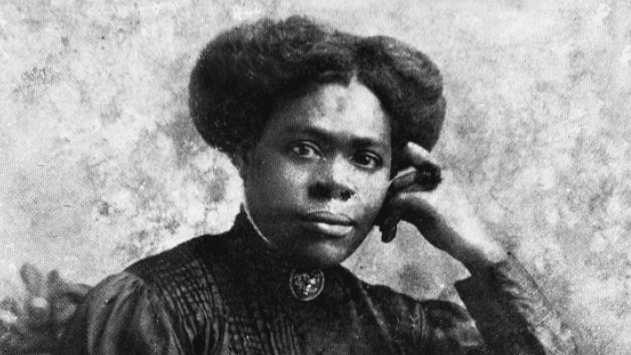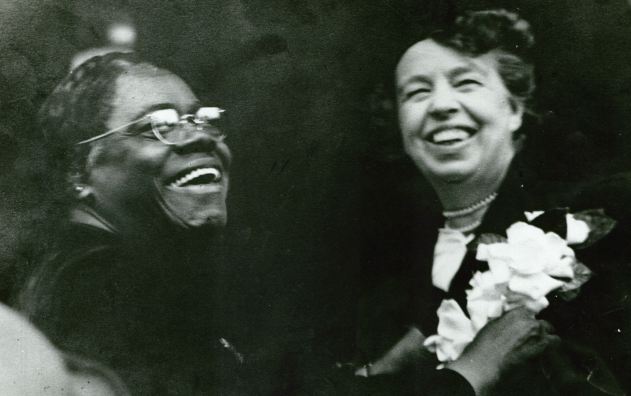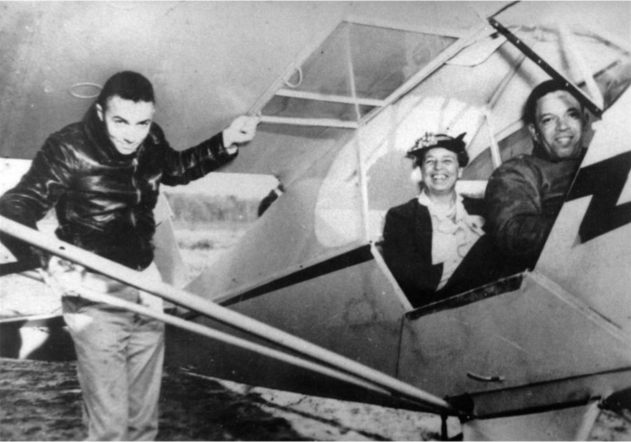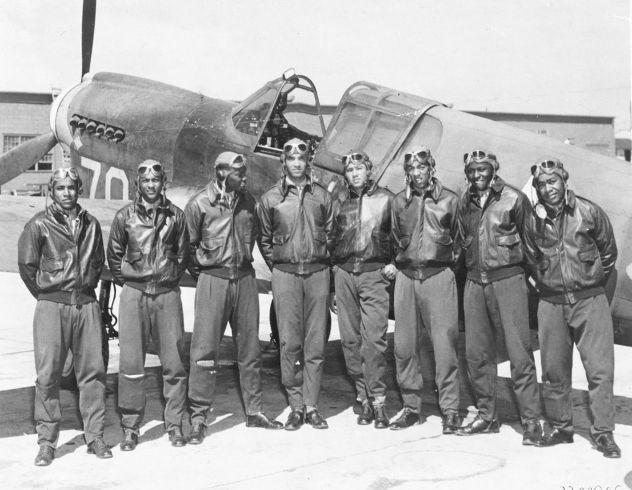
The names of many women who figure prominently in American history are instantly recognizable: Harriet Tubman, Rosa Parks, Susan B. Anthony. But so many others, who led equally courageous lives, are less well-known.
Dr. Mary McLeod Bethune, the founder of the historically Black Bethune-Cookman University in Daytona Beach, Florida, led a similarly storied life, yet many people remain unaware of the details surrounding her efforts on behalf of Black civil rights.
Without Bethune’s tireless work championing the rights of Black people, the famed Tuskegee Airmen may not have existed. She, along with Eleanor Roosevelt, played a vital part in the integration of the pilot program that ultimately led to America’s first Black military airmen.
Born in 1875 to formerly enslaved parents in South Carolina, Bethune was the 15th of 17 children and the first to be born free. From an early age, she dreamed of attending school.

Dr. Tasha Youmans, dean of Bethune-Cookman university library, told AccuWeather that although Bethune had a strong desire to learn from an early age, she was denied because of the color of her skin.
“Throughout her life, she longed for an education and, of course, because it was the segregated South, she didn’t have those opportunities,” Youmans said.
At age 11, she was finally able to attend school at a Presbyterian church and ultimately graduated from seminary with dreams of becoming a missionary but was, once again, thwarted by racism.
“When she tried to become an African missionary, she was told ‘no’ because colonization had begun in Africa and they didn’t want free Blacks to come over and taint the views there,” Youmans explained.
With no church to sponsor her missionary work, she married Albertus Bethune and decided to become an educator. She moved to Florida where, in 1904, McLeod Bethune opened a boarding school to teach young women who, like her, wanted an education. The Daytona Beach Literary and Industrial Training School for Negro Girls was the only school of its kind that served African-American women on the East Coast. In 1929, the school merged with the all-male Cookman Institute to form Bethune-Cookman College.
CLICK HERE FOR THE FREE ACCUWEATHER APP
Mary McLeod Bethune wasn’t much older than Bethune-Cookman University student Kimberlyn Lewis, 19, when she started the institute. “Even in the position I’m in now, I couldn’t possibly fathom doing the stuff she was doing like at my age, a couple years later. She was so truly ahead of her time,” Lewis told AccuWeather.
Due to her charismatic personality, Bethune proved a talented fundraiser, earning financial support for Bethune-Cookman College from the likes of the Rockefellers and James Gamble of Proctor & Gamble.
“She became very good friends with Eleanor Roosevelt. She was an adviser to four presidents — that’s unheard of. I don’t know that any other person has been able to do that since that time, but she did it,” Youmans said.
The discrimination Bethune faced throughout her life pushed her to champion racial and gender equality whenever she encountered it. In 1935, she became the founding president of the National Council of Negro Women.
Bethune also played a role in the transition of Black voters from the Republican Party — “the party of Lincoln” — to the Democratic Party during the Great Depression when President Franklin D. Roosevelt was enacting his New Deal programs aimed at helping people. Bethune was also the only female member of Roosevelt’s influential “Black Cabinet.”
Yet it was her friendship with first lady Eleanor Roosevelt that ultimately led to the desegregation of pilot training programs in the United States and the eventual integration of Black men into the military.
“Most people don’t know firsthand that she advised four presidents or [about] her role with the Tuskegee Airmen,” Youmans said.

Bethune began leveraging her friendship with Eleanor Roosevelt to lobby for integrating the government-sponsored Civilian Pilot Training Program and to bring the program to the campuses of historically Black colleges and universities. Due to her efforts, West Virginia State College became the first Black school to adopt an aviation program and receive its first military airplane in 1939. That precedent led to the authorization of the Tuskegee Institute in Alabama later that year.
Tuskegee was chosen for Black military pilot training in part because the Tuskegee Institute had already begun training African American civilian pilots, according to TuskegeeAirmen.org. Also, “the region had more days of good flying weather than many other parts of the country, and the area already had a segregated environment, which was consistent with the segregated training.”
“She was able to get into places that nobody could ever imagine,” Youmans said proudly. “She was very instrumental in making that connection through Eleanor Roosevelt, to get them the funds that they needed for those aircraft workers.”
Eleanor Roosevelt became so involved in the effort that she visited the Tuskeegee Institute’s Moton Airfield in 1941 and, despite objections from her Secret Service detail, asked chief flight instructor and Tuskegee pilot Charles Anderson if he would take her flying.

In what March Air Reserve Base reported as “possibly the first time a Black man had ever flown a plane with a white woman as his passenger,” the first lady spent more than an hour flying over the skies of Alabama. The highly publicized visit solidified the depth of Eleanor Roosevelt’s support for Black pilots and the institute’s training program.
Although African Americans had participated in every conflict since the Revolutionary War, they remained segregated. After her much-publicized visit to the Tuskegee Institute, Eleanor Roosevelt lobbied her husband for the integration of the country’s aviation forces.
In 1942, with a need for more troops as the war intensified in Europe, FDR issued Executive Order No. 9279, a compromise of sorts: Black men could register for the draft, but they would remain segregated and the military would determine the proportion of Black men inducted into the service. The order, however, forced all services to officially end restrictions placed on African Americans regarding military service, ultimately leading to the creation of the Tuskegee Airmen.

Shortly thereafter, Tuskegee University was awarded the U.S. Army Air Corps contract to help train America’s first Black military aviators. From 1941 to 1946, some 1,000 Black pilots were trained at Tuskegee. Additionally, The Tuskegee Weather Detachment, made up of 15 men, formed on March 21, 1942, originally organized as part of the Tuskegee Army Flying School, according to the American Institute of Physics.
“If you’re a pilot, you want to have excellent, precise weather data,” Dr. Molefi Asante, professor and chair of Temple University’s Department of Africology and African American Studies, told AccuWeather. “Many of the African American pilots preferred to have African American weathermen who would give them the most precise information about flight paths and so forth.”
The Tuskegee Airmen succeeded in escorting bombers during World War II and had one of the lowest loss records of all the escort fighter groups.
By the end of 1944, there were 700,000 African Americans in the Army; 165,000 in the Navy; 5,000 in the Coast Guard; and 17,000 in the Marine Corps, according to the Vallejo (Calif.) Times-Herald.

In 1948, President Harry Truman enacted Executive Order No. 9981, which directed equality of treatment and opportunity in all of the United States Armed Forces and eventually led to the end of racial segregation in the U.S. military forces.
Had it not been for the forward-thinking of Bethune and the support of Eleanor Roosevelt, the Tuskegee Airmen may never have existed. Bethune, whose living example showed young Black women and men that you can come from nothing and achieve anything, died one year after the Supreme Court’s landmark decision regarding Brown v. Board of Education, which ended decades of racial segregation in America’s public schools.
Youmans told AccuWeather that Bethune-Cookman University’s trajectory in the face of unfathomable discrimination is Bethune’s ultimate legacy.
“This was a dream of hers from the time she was a little girl and we’re still here. We’re still striving and we’re still educating students.”
For the latest weather news check back on AccuWeather.com. Watch the AccuWeather Network on DIRECTV, Frontier, Spectrum, fuboTV, Philo, and Verizon Fios. AccuWeather Now is now available on your preferred streaming platform.
Produced in association with AccuWeather.com.
Recommended from our partners
The post The Woman Whose Tireless Efforts Helped Launch The Famed Tuskegee Airmen appeared first on Zenger News.









